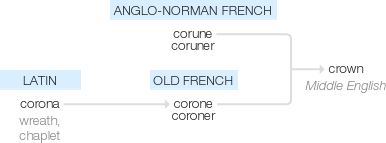Crown
Middle English: from Anglo-Norman French corune (noun), coruner (verb), Old French corone (noun), coroner (verb), from Latin corona ‘wreath, chaplet’.
wiktionary
From Middle English coroune, croune, crowne, from Anglo-Norman coroune, curune, corone (French couronne), from Latin corōna(“garland, crown, wreath”), from Ancient Greek κορώνη(korṓnē). Doublet of corona. Displaced Middle English beigh, biȝ, from Old English bēag(“crown, garland, necklace”).
crown
etymonline
crown (n.)
early 12c., coroune, croune, "royal crown, ornament for the head as a symbol of sovereignty," from Anglo-French coroune, Old French corone (13c., Modern French couronne) and directly from Latin corona "crown," originally "wreath, garland," related to Greek korōnē "anything curved, a kind of crown."
According to Watkins this is from a suffixed form of PIE root *sker- (2) "to turn, bend." But Beekes considers the "crown" sense as derived from the formally identical Greek word korōnē "crow" (see raven), which, he says, was used metaphorically "of all kinds of curved or hook-formed objects." "Moreover," he writes, "the metaphorical use of [korōnē] 'crow' is nothing remarkable given the use of its cognates ...; the metaphors may have originated from the shape of the beak or the claws of the bird." Compare Latin corax "crow," also "a hooked engine of war," French corbeau "raven," also "cantilever;" English crowbar, etc.
Old English used corona, directly from Latin. Figuratively, "regal power," from c. 1200. From late 14c. as "a crowning honor or distinction." From c. 1300 as "top part of the skull or head;" from 1670s as "top of a hat." From 1804 as "part of a tooth which appears above the gum."
Extended late 14c. to "coin bearing the imprint of a crown or a crowned head," especially the British silver 5-shilling piece. Also the name of monetary units in Iceland, Sweden (krona), Norway, Denmark (krone), and formerly in German Empire and Austria-Hungary (krone). Crown of thorns was late Old English þornene crune.
crown (v.)
"bestow a crown or garland upon," late Old English corounen, from Old French coroner, from corone (see crown (n.)). Related: Crowned; crowning. The latter in its sense of "that makes complete" is from 1650s.
